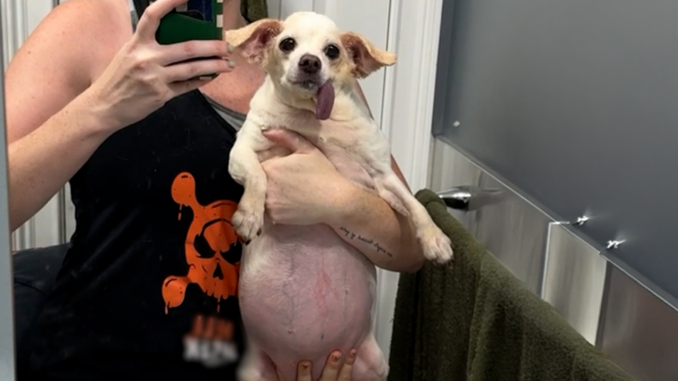
Introduction: A New Beginning for an Overweight Senior Dog
As dogs grow older, they often slow down. They may become less active, more lethargic, and sometimes, struggle with weight gain. But for one overweight senior dog, the discovery of toys sparked a new chapter in life—one filled with joy, playfulness, and unexpected transformation.
This heartwarming story is about a senior dog who found new enthusiasm for life, not by simply dieting or taking long walks, but by developing a surprising obsession with toys. What started as a playful habit soon turned into a journey of fitness, well-being, and renewed energy for the once sluggish pup.
Let’s dive into this inspiring tale of a senior dog whose new obsession became the key to a healthier, happier life.
The Senior Dog’s Struggles: A Life of Slow Movement and Weight Gain
When we think of senior dogs, we often picture them lying lazily in their beds, eyes half-closed, content in their slower pace of life. This dog, like many older pups, had spent most of its life as a more sedentary companion. Over the years, it had gained weight, struggled with mobility issues, and lost some of the pep it once had as a younger dog.
Age-related conditions such as arthritis and joint pain had set in, making the once-active dog less inclined to move or play. This, coupled with the natural slowing down that happens as dogs age, contributed to the dog’s weight gain. The owners, concerned for their pet’s health, knew that something had to change, but they weren’t sure how to help their senior companion regain energy and vitality.
The Turning Point: A New Obsession with Toys
It all began when the dog’s owners decided to introduce new toys into its environment. At first, it seemed like a harmless addition—a way to encourage some activity. But the response was unexpected. The dog, which had previously shown little interest in toys, suddenly became obsessed. Whether it was squeaky balls, plush animals, or interactive toys, this senior dog wanted them all.
What had started as a small interest turned into a full-blown obsession. The dog began spending hours playing with its new toys, tossing them around, pouncing, and even fetching. The toys sparked a level of excitement and energy the dog hadn’t displayed in years.
The Benefits of Play for an Overweight Senior Dog
Toys became more than just entertainment for this dog—they became a tool for transformation. The physical activity required to play with the toys helped the dog shed some of its extra weight. While it wasn’t suddenly running marathons, the increased movement—whether it was chasing after a toy or engaging in playful tug-of-war with its owners—was enough to boost its fitness levels.
In addition to the physical benefits, playing with toys also gave the dog a sense of mental stimulation. Senior dogs, just like younger ones, need mental enrichment to stay sharp and engaged. Interactive toys, puzzle feeders, and even simple squeaky toys helped stimulate the dog’s mind, keeping it active and involved.
The Role of Consistent Play: A Routine That Boosts Health
One of the keys to the dog’s newfound enthusiasm was consistency. The owners made sure to incorporate play into the dog’s daily routine. Playtime became a regular part of the dog’s life, a time to bond, move around, and enjoy some much-needed fun.
It wasn’t about making the dog run laps or forcing it into an exhausting workout. It was about taking small, manageable steps to incorporate movement and mental stimulation throughout the day. Over time, these daily play sessions began to show results, both physically and emotionally.
How the Toy Obsession Affected the Dog’s Physical Health
As the dog continued to engage with its toys, something remarkable happened. The extra weight began to come off gradually. While the dog wasn’t getting slimmer overnight, the steady increase in physical activity was starting to have a noticeable effect. The dog’s mobility improved, and it could move around with less stiffness in its joints.
The dog also appeared happier. Senior dogs often experience depression due to their lack of mobility and physical limitations, but play seemed to lift the dog’s spirits. The excitement and joy that came from playing with toys brought a smile to the owner’s face every time they saw their dog chase after a squeaky ball or roll over in delight.

The Emotional Impact: A More Engaged and Playful Senior Dog
The transformation wasn’t just physical—it was emotional too. The dog became more interactive with its owners, wagging its tail excitedly when they picked up a toy. Playtime became a time of joy, connection, and bonding. The owners could see the positive changes in their dog’s mood, and the dog’s increased energy helped strengthen the bond between them.
For the owners, seeing their dog go from lethargic to lively was a beautiful reminder of the power of play and stimulation, no matter a dog’s age. The dog’s obsession with toys became a symbol of the importance of never giving up on an older dog, no matter how much their energy levels may decrease.
Choosing the Right Toys for an Overweight Senior Dog
Not all toys are created equal, especially for senior dogs who may have certain physical limitations. It’s important to choose toys that are gentle on their joints but still encourage movement. Here are some suggestions for selecting the best toys for an overweight senior dog:
- Soft, plush toys: These are easy on the dog’s teeth and joints but still fun to toss around.
- Interactive toys: Toys that require the dog to think, like puzzle feeders, can provide mental stimulation.
- Squeaky toys: Dogs love the sound of squeaky toys, which can encourage them to engage in more play.
- Balls and fetch toys: Soft balls or fetch toys are great for gentle play and can help with movement without putting too much strain on the dog.
How Play Can Help Prevent Common Senior Dog Problems
Playtime isn’t just about fun—it’s also about health. For senior dogs, staying active can help prevent or alleviate a number of common age-related issues, including:
- Arthritis: Gentle movement through play can help keep the joints limber and reduce stiffness.
- Obesity: Regular play helps prevent weight gain and encourages a healthier body condition.
- Cognitive Decline: Interactive and mentally stimulating toys help keep the mind sharp, preventing or delaying cognitive decline.
The Importance of Patience: Supporting Your Senior Dog’s Transformation
While the transformation was remarkable, it didn’t happen overnight. The owners were patient with their dog, respecting its pace and capabilities. They didn’t force long, strenuous play sessions. Instead, they allowed their dog to play at its own speed, gradually increasing the amount of time spent engaging with toys. This patience was key to the dog’s success, both physically and emotionally.
By understanding the dog’s limitations and working within them, the owners helped the dog rediscover joy and energy. The key lesson here is that it’s never too late to bring new joys into a senior dog’s life, and even small changes can have a big impact.
Conclusion: A Senior Dog’s Transformation Through Toy Play
This story is a testament to the power of play and the importance of compassion when it comes to caring for senior dogs. What began as an innocent introduction of toys to an overweight, sluggish dog turned into a life-changing transformation. The dog’s newfound obsession with toys led to physical improvements, increased energy, and a renewed spirit of playfulness.
For senior dogs, finding activities that keep them engaged is crucial for their health and happiness. Play doesn’t just provide entertainment—it can help improve mobility, mental stimulation, and even emotional well-being. This story proves that age is just a number, and with the right tools and a little patience, even the oldest dogs can rediscover the joy of life.
Frequently Asked Questions
1. How can I help my overweight senior dog get more active?
Start by introducing gentle activities like playtime with toys. Gradually increase the duration and variety of activities to help your dog become more active at a comfortable pace.
2. What are the best toys for senior dogs?
Soft plush toys, interactive puzzle toys, squeaky toys, and gentle fetch toys are all great choices for senior dogs. Make sure they are easy on your dog’s joints and teeth.
3. Can toys help with a dog’s weight loss?
Yes! Toys can encourage your dog to move more, which helps burn calories and maintain a healthy weight. Combined with a balanced diet, play can support weight management in senior dogs.
4. How do I know if my senior dog is ready for more play?
Look for signs of interest in toys, such as wagging tails, pawing, or picking up toys. Always observe your dog’s physical limitations, and don’t push too hard. Let your dog set the pace.
5. Is it normal for senior dogs to be less active?
Yes, as dogs age, they often slow down. However, it’s still important to keep them engaged with gentle activities to maintain their physical and mental health.
